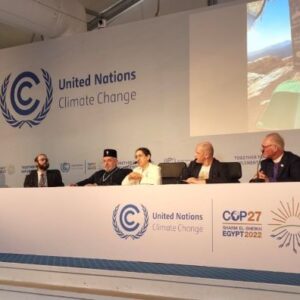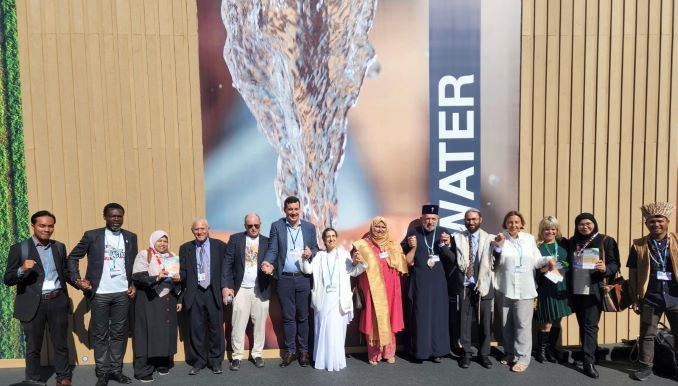PHOTO: Interfaith leaders and climate justice activists at COP27 posed for photo outside of the meeting rooms
By Evelyn Kpadeh Seagbeh
Sharm El Sheik, Egypt- Climate Change many say is a very delicate issue and more of the sciences and not a religious or spiritual venture, but the ongoing climate change conference is seeing religious and inter-faith leaders pushing what they consider substantial tools to help the world deal with the global impacts of climate change.
The group is under the banner, The Interfaith Center for Sustainable Development.
The interfaith reveals the connection between religion and ecology and it mobilizes people to act.
Earlier this week, on the top of the memorialized mountain, Mont Sanai, religious leaders met and declared the 10 principles of Climate Repentance. It is also known as the ‘Prophetic Call for Climate Justice.
Mount Sanai is an important religious pilgrimage site, where the prophet Moses is said to have received the 10 Commandments directly from God. The mountain attracts hundreds of people from around the world and has become a major tourist site in Egypt. Additionally, Mount Sinai is a mountain memory and meaning looms largely as a place of revelation in the collective consciousness of Christianity, Judaism, Islam, and others religion.
The 10 principles for Climate Change religious leaders are calling for a reexamination of deep-seated attitudes and identifying ways to transform people’s attitudes toward the well-being of Earth, mankind’s common home.
“The ecological crisis is a spiritual crisis of how we deal with spiritual beings and the question is when will religion the sleeping giant wake up to address the ecological crisis”

“some people think that it’s perhaps psychicrigic to talk about 10 universal principles, but I think it’s psychicrigic to the great God’s creation and God wants us to take care of it because we realize that humanity needs to do a better job of living in balance on God’s creation,” Rabbi Yonatan Neril of The Interfaith Center for Sustainable Development in Jerusalem told world leaders.
The role of the religious communities and religious leaders the Interfaith group says is key in addressing climate change and climate justice and one that will require deep transformation within society, change of attitudes and hearts, and helping people’s knowledge of the changes that are critically needed to diminish long-term harm to the planet, in order to save the world and God’s creation.
The religious leaders have been engaging and sharing their perspectives, but whether their 10 Principles to climate change will make it into the final documents at the COP27 is yet unknown.
For her, Sr. Maureen Goodman, said “the earth does not need to be saved.” Calling on humanity to develop a relationship where both the earth and humanity can flourish that the world needs to put back into perspective.
In the 10 Spiritual Principles for Climate Repentance, the group outlined common grounds between diverse religions, a positive attitude to life that can inform practical decisions and negotiations and as well give hope and meaning to individuals struggling with the burden of climate anxiety, who seek to find their place and identify their responsibility at this time of crisis.
The principles further seek to initiate a process of climate repentance, bringing a broader understanding, and calling for effective action from all actors.
With the world experiencing the warmest weather ever, flooding in Pakistan, Nigeria, Liberia, and drought in parts of Ethiopia, Somalia, northern Italy, south-eastern France, Hungary, and Romania the religious leader wrapped up by cautioning that climate change effects know no religion and border.
The world has and continues to record catastrophic incidents of rippling effects of climate change which the United Nationals Secretary General, António Guterres has described as “climate hell” at the just-ended United Nations General Assembly in the United States.
This story is produced as part of the 2022 Climate Change Media Partnership, a journalism fellowship organized by Internews’ Earth Journalism Network and the Stanley Center for Peace and Security.

